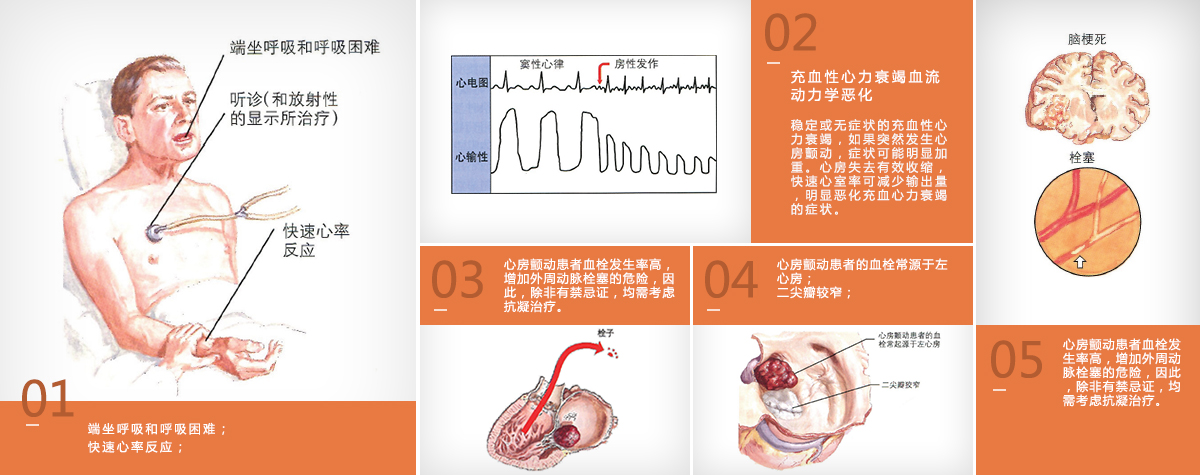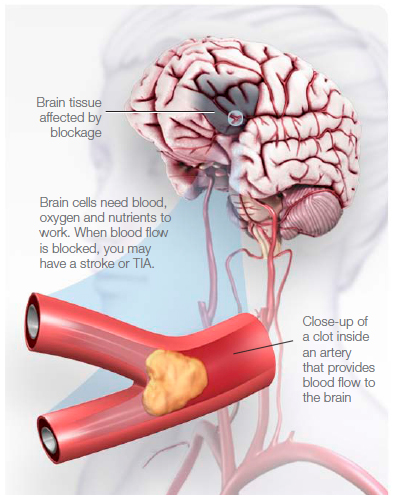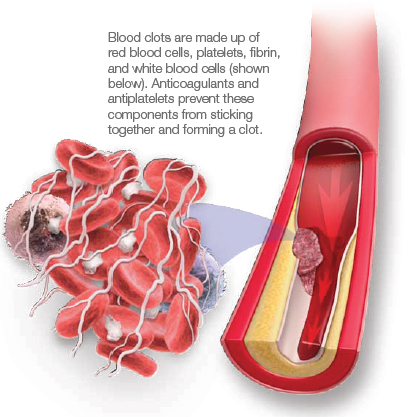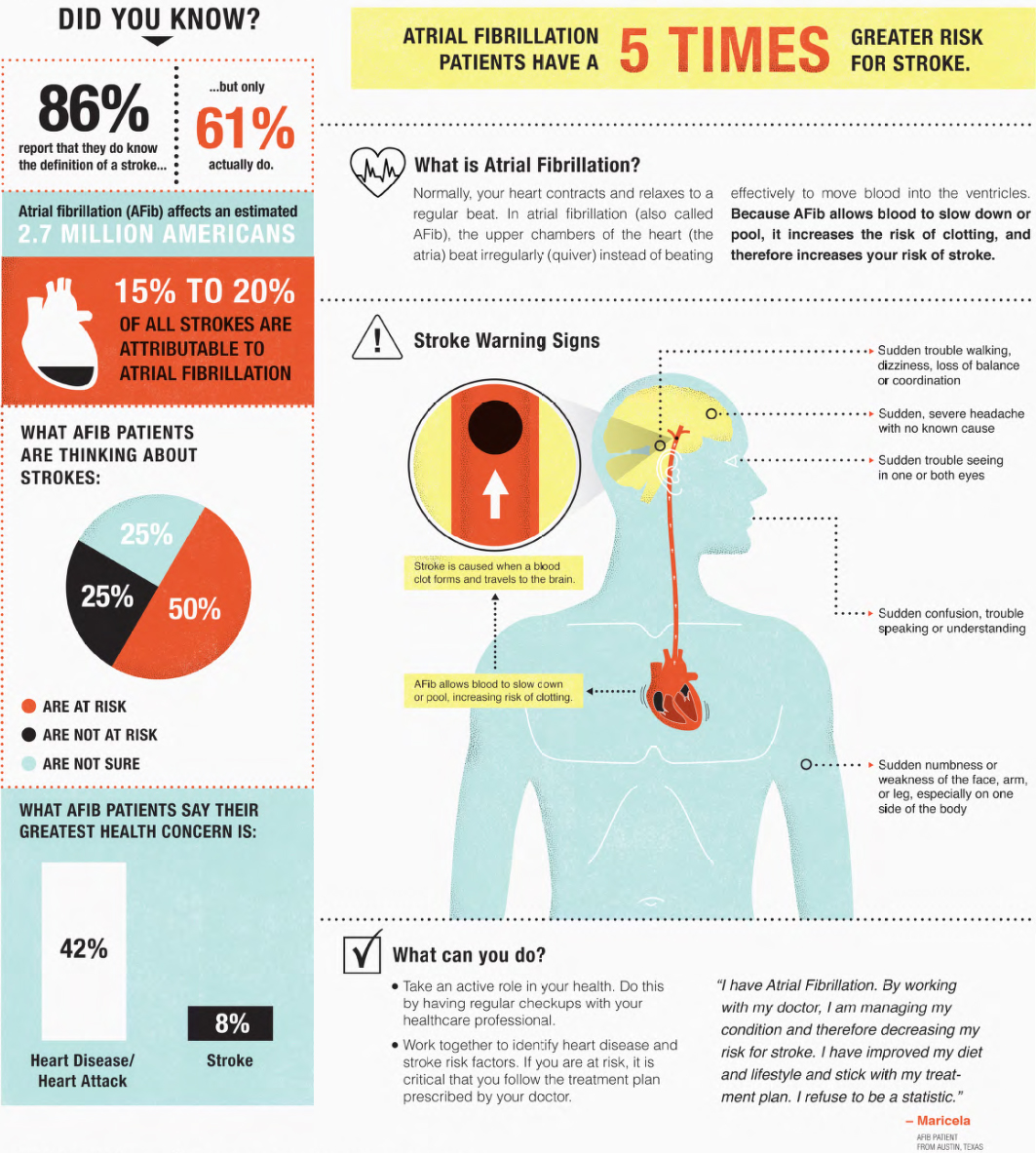房颤并发症
Complications Of Atrial Fibrillation

Under normal circumstances, your heart contracts and relaxes to a normal beat. Some cells in the heart produce electrical signals that cause the heart to contract and supply blood. Our monitor captures these electrical signals and connects them to our equipment through electrodes connected to your chest.
The resulting captured electrical signal is displayed on an electrocardiogram, electrocardiogram or electrocardiogram.
This is a painless, non-invasive procedure for recording cardiac electrical activity that can help diagnose arrhythmias.
正常心动周期
| Arrhythmia type | definition | symptom |
|---|---|---|
| Arrhythmia type | In the atrial flutter, your heart's upper chamber (atrium) beats too fast. This causes the heart to beat at a fast, regular rhythm. If left untreated, atrial flutter (AFL) can also cause another type of arrhythmia called atrial fibrillation. | Some people do not have the symptoms of atrial flutter. Others describe the following symptoms: palpitations (accelerated heartbeat or throbbing of the chest). There is a feeling of swaying in the chest, shortness of breath, anxiety. |
| Atrial fibrillation | Atrial fibrillation is atrial fibrillation or atrial fibrillation. This is an irregular and often very fast heart rate that usually results in poor blood flow to the body. Although this condition is not considered fatal, people with atrial fibrillation may develop a thrombus and stroke five to seven times. | Symptoms that may occur suddenly or suddenly stop may include: Heart palpitations, this is a kind of uncomfortable feeling of racing, irregular heartbeat or trigger in your chest, dizziness, confusion, shortness of breath, chest pain |
Left is the normal cardiac cycle, right is the atrial fibrillation cycle

Stroke is the fourth leading cause of death in America today. It’s also a major cause of severe, long-term disability. People over 55 years old have more chance of stroke, and the risk gets greater as you get older. Men,African Americans and people with diabetes or heart disease are the most at risk for stroke. About 7 million people who have had strokes are alive today.
To protect yourself and your loved ones from the serious effects of stroke, you should:

A stroke happens when a blood vessel that feeds the brain gets blocked (ischemic stroke) or bursts(hemorrhagic stroke). Then that part of the brain can’t work, and neither can the part of the body it controls.
TIAs, or transient ischemic attacks, are “warning strokes” that can happen before a major stroke. They happen when a blood clot clogs an artery for a short time. The signs of a TIA are like a stroke, but they usually last only a few minutes. If you have any of these signs, get to a hospital right away!
Uncontrolled high blood pressure, high blood cholesterol, smoking and heart disease put you at a higher risk for stroke.
Call 9-1-1 or the emergency medical services (EMS) in your area (fire department or ambulance) immediately.
It’s important to get to a hospital right away. Also, check the time so you’ll know when the first symptoms appeared. It’s very important to take immediate action.
If given within three hours of the start of symptoms, a clot-busting drug can reduce longterm disability for the most common type of stroke.
You could save your life or save yourself from being disabled by stroke if you do these things:
Anticoagulants and antiplatelet agents are medicines that reduce blood clotting in an artery, a vein or the heart.
Clots can block the blood flow to your heart muscle and cause a heart attack.
They can also block blood flow to your brain, causing a stroke.

Anticoagulants are drugs that are given to prevent your blood from clotting or prevent existing clots from getting larger.
They can keep harmful clots from forming in your heart, veins or arteries.
Clots can block blood flow and cause a heart attack or stroke.
If you do as your doctor tells you, there probably won’t be problems. But you must tell your doctor right away if:
These drugs, such as aspirin, keep blood clots from forming. Many doctors now prescribe aspirin to heart patients for this reason.Aspirin can save your life if you have heart problems.You don’t need a prescription to get it, but it’s just as important as any other medicine your doctor tells you to take. You must use it just as you’re told.
Aspirin:

It’s a heart condition in which the upper chambers of the heart (called the atria) beat too rapidly and cause the lower chambers of the heart (called the ventricles) to pump the blood abnormally and ineffectively throughout the body.
Some possible risk factors for AFib are: advanced age, heart disease (prior heart attack or heart failure), high blood pressure, diabetes, excessive alcohol drinking, smoking, obesity, sleep apnea, persons with heart valve problems and/or other chronic medical or heart related problems. Some studies support the theory of heredity.
Yes, some people never have symptoms and they are diagnosed by a physical exam and an EKG/ECG.
More men than women are diagnosed with AFib but women have a higher rate of stroke-related deaths.
In certain cases, medical intervention may be needed to restore the heart’s normal rhythm. This may involve electrocardioversion or medications to control rate and rhythm. In any case, you must see a doctor if you are having symptoms.
The greatest risk of AFib is stroke. You are 5 times more likely to have a stroke than someone who doesn’t have atrial fibrillation. You also have a risk of eventual heart failure due to the weakening of the heart muscle.
Since stroke is a potential risk factor in those who have AFib, you need to know the symptoms. F.A.S.T. is an easy way to remember the sudden signs of stroke: Face drooping, Arm weakness, Speech difficulty, Time to call 9-1-1. Other signs of stroke include: severe headache, dizziness, loss of balance, or trouble walking, confusion or trouble speaking/understanding, numbness or weakness on one side of the body or face, blurry or darkened vision. Call 9-1-1 if these symptoms occur.
Yes, some people can live very healthy and active lives. Controlling your risk factors for heart disease and stroke and knowing what can possibly trigger your AFib will help improve your long-term tolerance. Follow your doctor’s orders and stay on your current treatment path.
We don’t usually say that AFib is curable, but we do know that there are reversible causes for AFib, and if those causes are treated, the AFib may not return. AFib, regardless of the duration, needs to be monitored by a physician. AFib is mostly preventable, or treating the underlying cause sometimes prevents AFib from reoccurring. There are different forms of AFib (paroxysmal, persistent and longstanding); each one with variations in prognosis and treatment plan. Sometimes the symptoms are continual and occasionally the symptoms go away on their own. Again, all those who experience AFib will need regular check-ups on the condition.
Generally, no. You can die from complications that result from having AFib, however. Two risks that persons with atrial fibrillation face are the possibility of having a stroke or heart failure. This answer, however, is assuming that you have no other underlying heart conditions. The most important thing you can do is to work with your doctor or other healthcare provider to make sure that you are doing all you can to prevent any complications that could occur as a result of having AFib.
A heart attack is an interruption in blood flow to the heart which results in tissue damage to the heart. This is an emergency situation and you need to call 911 immediately. Atrial fibrillation is an abnormal rhythm of the heart which results in ineffective blood flow to the body. The symptoms of a heart attack are: chest discomfort that can be described as “pressure, sharp pain, heaviness.” The pain can travel down your arms, up into your jaw area or into your back or stomach. The pain can be mild or severe. It can also come and go. It can be accompanied by shortness of breath, sweating, nausea or confusion.
As soon as you notice the symptoms of AFib (fatigue, heart fluttering or pounding, fainting or dizziness, shortness of breath, anxiety), you need to contact your physician. Even if your symptoms go away, you still need to have a physical exam.
An electrophysiologist is a cardiologist that specializes in the study of the electrical activities of the heart. They have completed two more years of fellowship beyond a general cardiology fellowship. They are trained to perform interventional cardiac electrophysiology studies and surgical device implantations.
Yes, as long as you are cleared by your physician, you are able to perform any normal activities of daily living that you are able to tolerate.
Yes. However, some people experience dizziness or even fainting with their AFib episodes. If you feel dizzy or lightheaded, you need to pull over to the side of the road and stop. Discuss with your doctor whether you should alert your healthcare provider during an episode, and how to know if and when your AFib symptoms mean you should call 911.
In any emergency situation, having a patient’s medical history is very helpful. Be sure and write down the medication that you are taking and the dose. If you are taking oral anticoagulant medications (“blood thinners”), you should always wear a medical alert bracelet so that people know you may bleed easier than usual.
Most of the time, no, but you can control your “triggers”. In some people, different things cause their AFib to flare up. Caffeine, alcohol, stress, getting up in the middle of the night after being fully asleep, eating MSG, the heart rate increase that occurs during exercise…..these are all common “triggers” that might lead to an episode.
Medication is most often prescribed to control heart rate and rhythm. It is also prescribed to prevent or treat current blood clots. You could be on medicine from other underlying conditions. Your doctor will need to know the current meds you are taking so your new meds will not interfere. Some medications your doctor might prescribe for you are:
Both anticoagulants and antiplatelet agents are medicines that reduce blood clotting in an artery, a vein or the heart.
A risk of bleeding is associated with anticoagulants. Here are some things to watch for or report to your physician:
What is a good resource? Always check with your physician first if you have questions.